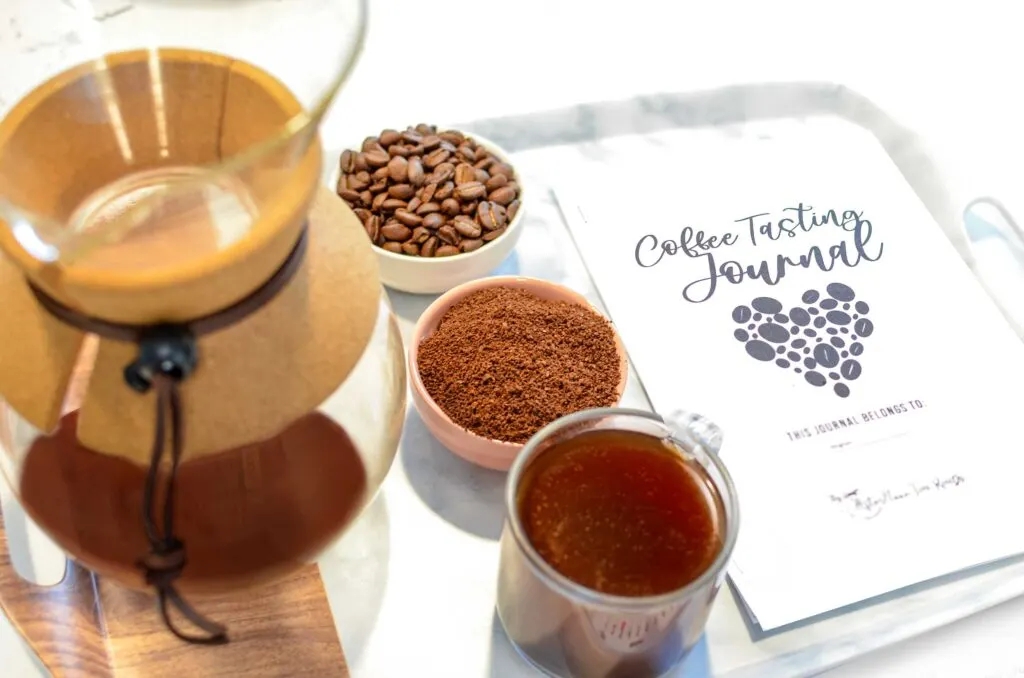Caffeine is life but did you know that coffee isn’t the only source of it? AND it isn’t only caffeine that has energizing properties!?
Coffee can come with some pretty bad side effects, especially if you’re drinking a lot of it. I mean, too much of anything isn’t good for our health.
There are other plants that are healthy coffee alternatives with energizing properties, and these are my top five!
Psst! This blog post contains affiliate links in it which sends me a bit of extra money if you use them… at no extra cost to you!
Why You Might Want A Coffee Replacement For Caffeine?
Let’s be real, coffee is great, but it isn’t always our friend.
Maybe coffee makes you instantly run to the bathroom? Coffee can also stress you out with extreme caffeine jitters and a fast heart rate?
There’s also the impending side effects once the caffeine from coffee wears off. Perhaps you go through coffee withdrawal with some terrible headaches? Or you’re met with a complete energy crash at the end of the day?
And these are just some of the negatives side effects to coffee…

Taste & Track Every Coffee You’ve Tried!
Refine your coffee palette with my Coffee Tasting Journal to record and take notes on every new coffee you try.
Shop my Coffee Tasting Journal on Etsy.
Top 5 Healthy Coffee Alternatives
Wether you want to cut off coffee completely or you’re looking for some caffeine alternatives for energy, here are my top five coffee replacements!
| Caffeine (mg / cup) | Read More | |
| Coffee (Filter) | 80-100*MedicalNewsToday | / |
| Black Tea | 64-112*MedicalNewsToday | Click Here |
| Matcha | 75-177*MedicalNewsToday | Click Here |
| Yerba Mate | 80 *NCBI | Click Here |
| Guayusa | 40-90*average from several sources | Click Here |
| Yaupon | 50-60*average from several sources | Click Here |
1. Black Tea: Caffeine Alternatives
The most popular caffeine alternative to coffee is black tea! Black tea comes from the leaves of the Camelia sinensis plant.
The Camelia sinensis plant also gives us white, green, oolong, yellow, and dark tea. Any of these types of teas will have caffeine, but black tea has the most.
P.S. You can read about the differences between the types of Camelia sinensis teas in my post here.
You might also be interested in reading…
Black tea also very similar to coffee, making it an easy switch from your morning cup of coffee. It’s dark, a tad bitter, and can be mixed to your liking with milk and sugar!
There are even specific breakfast blends to get you through the morning hump. Try out the different breakfast blends, like English, Irish, and Scottish! (See the difference between each here!).

Black Tea Is A Healthy Alternative To Coffee Because Of L-Theanine
Black tea has less caffeine than coffee but that’s not why it’s so much better than coffee.
Black tea also has the addition of L-theanine, an amino acid that balances out the caffeine to give a more slow and steady energy boost over a few hours
That means say goodbye to those horrible caffeine crashes and jitters! L-theanine is more of a relaxing, stress-reducing source of energy – if that even makes sense!
So black tea is one of the best coffee alternatives if you’re looking for some energy without the complete end of day crash!
P.S. Did you know that tea is also so powerful that it might even help you live longer!

2. Matcha Tea: Coffee Alternatives For Energy
If you’re looking for a bit more of a caffeine boost than black tea, matcha is one of the best coffee alternatives for energy.
Matcha is a type of Japanese green tea from the Camelia sinensis plant. Even though they are from the same plant, matcha and black tea could not be more different.
For starters, matcha leaves have been crushed into a powder. This means that when you make matcha, you drink the leaves themselves (instead of merely steeping the leaves for black tea). By drinking instead of steeping, you’re ingesting more of the benefits (and more caffeine!).
But on top of that, to be used as matcha, the plan also has to be shade grown. This increases the number of amino acids (which means there’s even more L-theanine and caffeine being produced).
Remember L-Theanine from black tea? L-Theanine is responsible for a slow and steady energy release.
You might also be interested in reading…
Shop My Matcha Essentials on Amazon
Matcha isn’t the easiest to make at home! You need some additional tools, or see some ways I make matcha with regular kitchen items here!

3. Yerba Mate: Caffeine Alternatives
Yerba Mate (yer-bah ma-tay) comes from the Ilex paraguariensis plant. It’s part of the Holly plant family that includes over 500 species (and 2 others also contain caffeine, but more on those in a bit!).
Yerba Mate is mostly popular in South America, where the plant originates. But over the years, it’s been gaining popularity for its health benefits and caffeine levels that rivals coffee.
You do have to watch out when drinking Yerba mate though. Although Mate might be healthier for you in some regards, it does come with some associated risks. Be sure to make sure it’s safe for you to drink!
Also, if you’re hypersensitive to the caffeine in coffee, Yerba Mate may have the same effects for you.
Read more about the benefits and risks or Yerba mate in my post here.
P.S. Yerba mate is also smoked, which isn’t the healthiest to consume and is a polarizing flavour profile. If you’re interested, you can find unsmoked Yerba mate on Amazon here.
What You’ll Need To Make Traditional Yerba Mate
Yerba Mate Caffeine Vs. Coffee Caffeine
Yerba mate might be one of the best coffee alternatives for energy: it contains the most amount of caffeine, but like tea, it doesn’t leave you with the jitters or a crash.
Yerba mata caffeine is able to stimulate while still be soothing. And this time it’s not thanks to L-Theanine, so how? Yerba mate is what’s known as an adaptogenic.
Being an adaptogenic means that it regulates all body systems. It’s able to adapt to your body and harmonize it – stabilizing different types of stressors.
Yerba mate also contains compounds like theophylline and theobromine.
Theophyline (which is also found in tea) is connected to our airways. It relaxes our airway muscles, helping us breath deeper and easier. Theobromine, on the other hand, is a mild stimulant increasing blood flow to the brain (p.s. it’s also found in chocolate!).
Read more about the differences between Yerba mate and coffee here.
Preparing Mate for the first time? You might want to read this…

4. Guayusa As A Coffee Replacement
Guayusa (Gwhy-YOU-sah) is from the ilex guayusa plant. It’s actually in the same plant family as Yerba mate (holly) it’s just a different species of tree.
Despite both Guayusa and Yerba mate being from the same plant family, they are quite different, read more about the difference here.
The Guayusa tree originates in northern South America, primarily the Amazon Rainforest and it’s primarily consumed in Ecuador.
Versus Yerba mate which is grown and consumed in Southern South America: Argentina, Uruguay, Paraguay and Brazil.
Guyausa does have slightly less caffeine than Yerba mate, but you might find it easier to drink and still makes one of the best coffee alternatives for energy…

Guayusa As Caffeine Alternatives To Coffee
The caffeine content in guayusa is lower than yerba mate, but it’s not a huge difference and it’s still higher than caffeine in Camelia sinensis teas.
Guayusa is similar to both mate and black or green tea in its compounds. In fact, it actually overlaps with both mate and Camelia sinensis tea, making it the best of both worlds!

Minimalist Coffee Wall Art
Decorate your home with minimalist coffee prints digital downloads. See it on Etsy.
Like tea, guayusa contains L-theanine, allowing the caffeine to give you an energy boost while still being relaxing. It counteracts the jitters and increased heart rate that comes with caffeine in coffee. This is also what’s missing from Yerba mate!
But like yerba mate, guayusa contains Theobromine which increases blood flow to the brain.
The only compound guayusa is missing is theophylline (which is found in both mate and tea). Remember, this responsible for relaxing our airway muscles.
The only downside is that guayusa is harder to find in North America.
- Unwrapped Tea Bags (100-Count)
- Certified Organic by OTCO
- Certified Kosher by KSA
- Contains Caffeine
- Guayusa Energy offers balanced, lasting rejuvenation, comparable to coffee without the buzz, jitters or crash. Davidson’s Guayusa Energy offers a robust, earthy flavor profile, characteristic of the South American herb.

5. Yaupon Coffee Alternatives With Caffeine
Yaupon (YO-ponn) is from the eIlex vomitoria family- which is also a part of the Holly plant family. This tree grows in a different region than both mate and guayusa. It actually grows in Southeastern North America (spanning borders from Texas to South Carolina).
Despite it being the only tea native to North America, it isn’t very known at all! And when compared to it’s South American cousins, there is hardly anything known about this tea, which unfortunately doesn’t make it the easiest tea to find.
I still have yet to find and try yaupon tea in Canada, but I’ve read that the taste has been compared to green tea with less bitterness (due to lack of tannins).
Like guayusa, yaupon caffeine levels aren’t as strong as in yerba mate. But it’s still a very healthy coffee alternative tea to consume and the caffeine reactions are similar to other holly plants and Camelia sinensis.
The non-coffee caffeine effects are thanks to theobromine in yaupon. You can read more about the differences between coffee and yaupon here.
P.S. Yaupon tea was actually used as caffeine alternatives during the American Civil War when coffee supplies were disrupted.
- Revive Mint Yaupon Tea – Cool, crisp, and refreshing, our Revive Mint is the perfect combination of organic peppermint and smooth whole-leaf Florida…
- Natural Caffeine – Similar to Yerba Mate and Guayusa, our jitter-free yaupon contains an average caffeine content of around 60mg/cup, providing you…
- 100% USDA Organic – We are committed to sustainable agricultural practices, fair-wage work, and brewing wild-crafted organic yaupon.
- Antioxidant Rich – More than just delicious, hot tea, yaupon holly contains ups to 30% greater antioxidant content than green tea and has less…

Non Caffeinated Coffee Alternatives For Energy
If you want to avoid caffeine altogether, there are in fact herbs and roots that can be coffee alternatives for energy that don’t contain any caffeine at all!
A very popular root is Ginseng – you may have seen that as an ingredient on several energy drinks.
But there’s a whole other list of herbs and roots you can try here!
Shop Coffee Alternatives on Amazon

Bundle & Save: Ultimate Coffee Tasters
Refine your coffee tasting palette with a printable Coffee Tasting Guide and take notes in your own coffee journal.
Read More Guides!
- 7 Times You Were Lied To About Coffee
- Everything You Need To Know About Matcha
- Everything You Need To Know About Yerba Mate
- 11 Popular Types Of Black Tea You Should Try (&Why!)
P.S. Click Image To Share Or Save Post For Later
Last update on 2025-05-28 / Affiliate links / Images from Amazon Product Advertising API



















